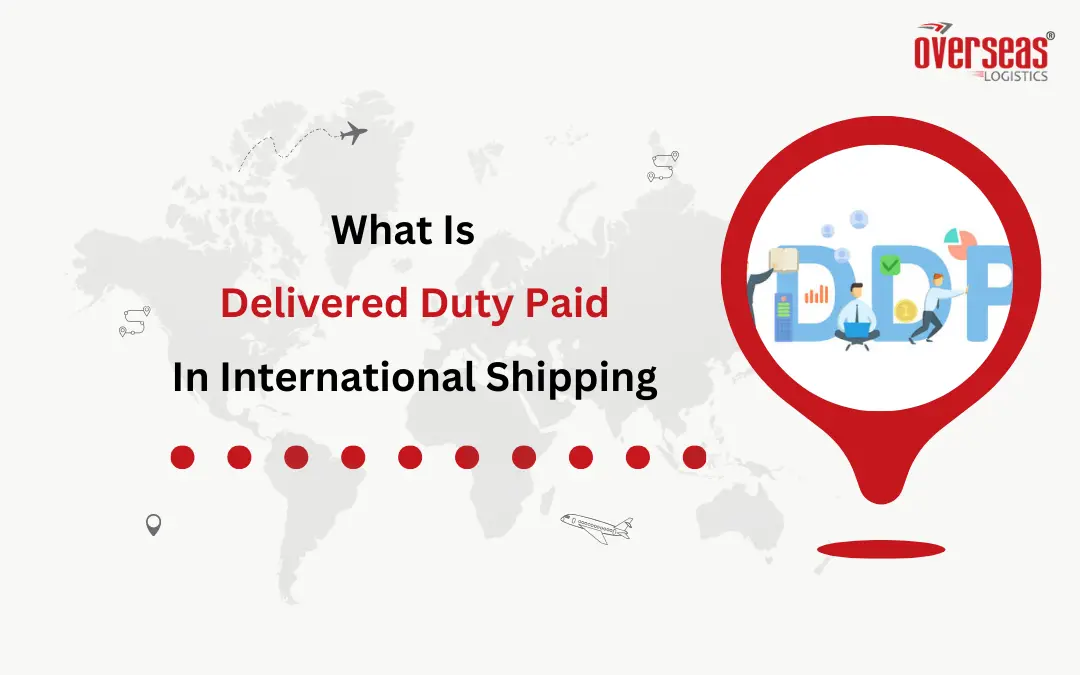In the intricate landscape of international commerce, where precision and clarity are paramount, understanding the nuances of Incoterms is a game-changer. Among these, Delivered Duty Paid (DDP) emerges as a strategic powerhouse, reshaping the dynamics of global trade. In this comprehensive guide, we delve deep into the intricacies of DDP, unraveling its complexities to empower businesses and elevate customer satisfaction.
Unlocking Delivered Duty Paid (DDP): An Incoterm Powerhouse
DDP, an acronym for Delivered Duty Paid, stands as a beacon of clarity in the realm of international courier. It’s not just a term; it’s a commitment from the seller to shoulder the entire spectrum of risks and costs, ensuring the goods reach the buyer’s chosen destination seamlessly. From navigating customs duties to managing transportation logistics, DDP is a comprehensive agreement with no room for ambiguity.
Seller’s Commitment Under DDP
Overall Obligations and Costs
In the realm of DDP, sellers assume a pivotal role, extending beyond physical goods movement. They commit to covering all expenses, including transportation, insurance, customs duties, and potential charges during transit. This commitment encapsulates a holistic financial responsibility, guaranteeing a hassle-free experience for the buyer.
Handling Export Clearance
Export clearance, a critical phase in international trade, demands meticulous attention under DDP. Sellers navigate legalities and paperwork, securing permits such as import-export codes, and adhering strictly to export regulations. This meticulous approach safeguards against delays and legal complications, ensuring a smooth transit process.
Managing Transport Arrangements
Logistics, a cornerstone of successful trade, falls squarely on the seller’s shoulders in a DDP agreement. From selecting the optimal mode of transport to coordinating with carriers, sellers orchestrate the journey of goods, minimizing risks of damage or loss during transit. This meticulous approach ensures timely and secure deliveries.
Coordination with Local Agents
The global nature of trade often necessitates collaboration with local agents. In a DDP setting, Sellers navigate challenges in the destination country, ensuring flawless last-mile delivery. This coordination ensures efficient handling of storage needs and local logistics challenges, elevating the overall customer experience.
Buyer’s Role in DDP
Receiving the Goods
In the DDP agreement, the buyer’s primary responsibility is the timely receipt of goods at the agreed-upon destination. Timely acceptance is paramount, preventing complications that may arise from delays and ensuring a smooth transaction.
Unloading of the Goods
Upon arrival, the buyer takes charge of unloading the goods. This involves orchestrating facilities or labor as needed and ensuring efficient unloading to prevent damage or delays. The buyer’s proactive role at this stage contributes to the overall success of the transaction.
Post-Delivery Inspections
A critical step is post-unloading, the buyer conducts a thorough inspection to validate the received goods’ condition and quantity. This meticulous examination safeguards against discrepancies, assuring that the goods meet expectations.
Handling Post-Delivery Formalities
While the seller manages customs and importation processes, some post-delivery formalities may fall on the buyer’s shoulders. Awareness of local compliance filings or regulatory procedures specific to the buyer’s location ensures a seamless transition post-delivery.
Advantages and Disadvantages of DDP
Advantages
Streamlined Shipping and Customs Processes
Under DDP, the complexity of managing intricate shipping and customs processes is significantly reduced. Sellers assume responsibility for transportation, customs clearance, and associated risks, minimizing uncertainties that often accompany international shipping.
Enhanced Customer Satisfaction
DDP removes the burden of unexpected costs and delays from the buyer, contributing to overall customer satisfaction. For eCommerce businesses eyeing global expansion, DDP acts as a catalyst by reducing barriers to entry into new markets.
Effective Risk Management
By assuming responsibility for shipping and customs clearance, DDP enables sellers to manage the risks associated with international shipping effectively. This strategic advantage positions businesses for success in the global marketplace.
Disadvantages
Financial Burden on Sellers
While advantageous for buyers, DDP places a significant financial burden on sellers. The comprehensive responsibility for costs, including customs duties and transportation, can impact profit margins.
Complex Customs Regulations
Navigating customs regulations in different countries poses a daunting challenge under DDP. Sellers must stay abreast of varying requirements, adding a layer of complexity to international trade operations.
Loss of Direct Control
In a DDP agreement, sellers often rely on third-party logistics services and carriers, leading to a loss of direct control over transportation and logistics. This loss of control may impact the ability to address issues promptly.
Conclusion
In conclusion, Delivered Duty Paid (DDP) stands as a powerful tool for businesses ready to embrace their demands. Offering a streamlined and customer-friendly shipping solution, DDP requires a deep understanding of its intricacies and a strategic approach to international logistics.
For businesses seeking expert assistance in navigating the complexities of DDP, Overseas Logistics emerges as a strategic ally. As logistics aggregators, Overseas Logistics enables businesses to outsource complex tasks like customs clearance, freight transportation, and order fulfillment. With Overseas Logistics, e-commerce businesses gain access to a courier recommendation engine, faster freight forwarding, customs clearance, and reduced shipping costs.
FAQs
What is the difference between DAP and DDP?
The main distinction lies in import duty, taxes, and security clearance responsibilities. DDP places the full burden on the seller, assuming these costs and risks from the shipment’s initiation to its destination. On the other hand, DAP involves the buyer in import clearance costs, making it a more seller-centric arrangement.
What is the difference between CIF and DDP incoterm?
CIF and DDP differ in allocating costs, risks, and responsibilities. While CIF has the seller covering costs, insurance, and freight to the destination port, with the buyer taking over from the port onwards, DDP requires the seller to handle all aspects, including transport, taxes, and import duties, up to the final destination.
What is the difference between DDU and DDP incoterm?
DDU and DDP differ in duties, taxes, and import clearance responsibility. DDU involves the seller ensuring safe delivery but leaves the buyer responsible for import duties and taxes. In contrast, DDP places the full shipping responsibility, including duties, taxes, import clearance, and final delivery, on the seller.
Who pays freight in DDP?
The seller is responsible for all freight costs in a Delivered Duty Paid (DDP) agreement.

